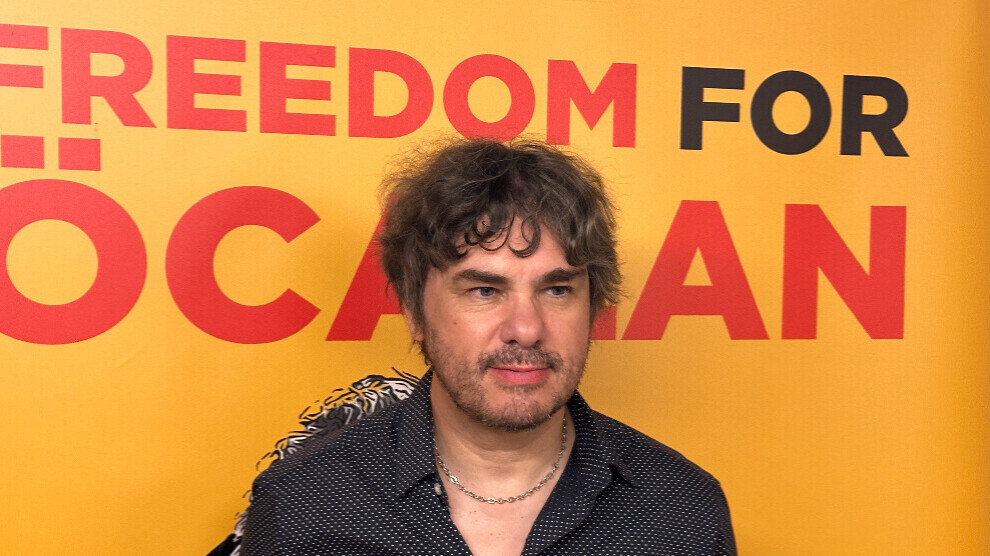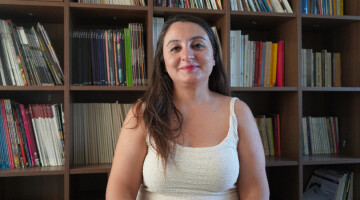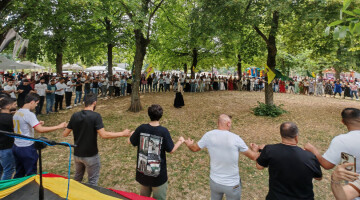Scottish author Sean Wilson has published 45 comics so far and, in his work, has dealt with figures such as Jeremy Corbyn, Noam Chomsky, Mahatma Gandhi and Nelson Mandela, among others. Three years ago, at the presentation of the comic book "Fight the Power!" in London, he met Estella Schmid, who has been working for Peace in Kurdistan for forty years. This meeting led him to write a graphic novel about the life of Abdullah Öcalan.
The comic book, written by Wilson, was illustrated by Keko, a Kurdish cartoonist living in Spain, and has been published in several languages. The German version was published by Unrast Verlag under the title "Abdullah Öcalan. An illustrated biography" and presented in Berlin on the occasion of Öcalan's 75th birthday in April. The English edition is called “Freedom shall prevail” and was presented as part of the Global Free Öcalan Days by Sean Wilson and Reimar Heider from the International Initiative Edition in Cambridge and London.
ANF spoke to Sean Wilson at the presentation in London.
The book has been translated into many languages and presented in several countries. What kind of reactions do you get, for example, from people who hear about Abdullah Öcalan for the first time?
A British anarchist was here earlier. He said he came to the event specifically because of this book. I couldn't discover how he found out about the book. There was also another guy from Iran who had somehow heard about the book. I got mostly positive reactions. Some said: why a comic? Because when they think of comics, they think of humor.
The interesting thing about this situation is that there is nothing new in terms of the general approach. Nowadays, complex comics are called "graphic novels" and there are many graphic novels that deal with various topics. For example, history, medicine, psychology, climate issues. Almost everything that can be called an interesting and difficult topic has already had a comic written about it. So it is a very established genre.
The special thing about this project is that it is the first book on this topic. And that's great because, while many art forms are declining, comics are on the rise and are becoming more deep and sophisticated. It's a great time to be a comic artist.
Comics are very new to Kurdistan...
The new generation doesn't read many books. Comic books are more used and are an important tool to reach the younger generation. And now this comic has become a textbook for children in Rojava. I think today's generation can get to know the Kurdish movement and Abdullah Öcalan better in this way.
Various studies at universities around the world have shown how people who are presented with a pure textbook, a magazine or a comic can absorb information more easily from a comic and - this is very important - remember it better. There is no point in getting information if you can't remember it. It is now very clear that graphic novels are a very good art form for presenting and remembering complex topics.
Also, a 17-year-old who is presented with a text of two or three hundred pages is usually intimidated. But if you present the same thing in a comic format, he immediately thinks, "Oh, that's interesting." This removes a psychological barrier to learning, and that's a very important point.
Why were you interested in Kurdistan, and why did you choose Abdullah Öcalan? Why did you get involved in this project?
When the idea came up, I started to find out about Öcalan, because up until then I knew almost nothing. And when I learned something about the Kurdish struggle, I immediately saw that it interested me, because it is about people who are trying to build a democratic society. The Kurds are also very gentle, they thanked me for writing such a book. That brought me closer to the struggle of the Kurdish people.
A very important point was also that this movement corresponds to my political views. I have an anti-capitalist and almost anarchist philosophy and I think democratic confederalism is a very good way to achieve a really better society.
As to Abdullah Öcalan, there are two things that are widely known: his personal pain, his personal struggle, but perhaps more importantly, the fact that he did not turn this democratic cause into a dictatorship or an oppressive structure, as many people have done throughout history. This is extremely important. This is true of the Communards in the 19th century, the Spanish in the 20th century, or the Kurdish people today. In trying to establish a truly democratic system, it must not turn into a dictatorship. And Öcalan seems to understand this and wants it to remain democratic. This is an important message to the world.
What impressed you most about his life?
The beginning of the book is about Abdullah Öcalan's childhood. We go back to his childhood and see how his childhood experiences are reflected in his current paradigm and philosophy. The experiences he had with other children at the age of seven led him to develop a strategy. And he is incorporating this strategy, which was born out of disputes between Kurdish children, into the struggle in the future. He has experience in people's lives, and that is how democratic confederalism was formed. You can see how he has incorporated his experiences into this paradigm.
Also, Abdullah Öcalan's experiences with violence and the oppression of women in his childhood were a basis for shaping the women's liberation struggle in the future. This is very impressive and can be recreated in the comic. You feel as if you are experiencing it yourself.
Do you think his ideas can solve the deadlocked conflicts, war and violence in the Middle East?
Yes, I think there are two points here. If we ask: "Are Abdullah Öcalan's ideas useful and practical?" then absolutely yes. But if we ask: "Will these ideas be able to be implemented?" then probably not. Because for the last 200 years, every movement that has tried to create a better system than capitalism, there has always been a powerful group that has come and blocked you, not just blocked you, but shot you. So the challenge is not whether the ideas are feasible, but whether you should give them a chance.
Those are two completely different points. I think that these ideas are feasible, and that is very important, because most people in Britain, in Turkey, in the world, believe that there is no feasible alternative to capitalism. That is wrong. There is such a space. We can create it. We can build that space. But there are powerful groups that don't want us to try. That is the difficulty. If we can overcome that obstacle, we can make these ideas a reality.
There is no information about Abdullah Öcalan and people all over the world are taking to the streets for his freedom.
Abdullah Öcalan must be released. When people talk about Abdullah Öcalan, they always make a connection with Nelson Mandela. His release is not completely impossible. However, I think Abdullah Öcalan himself would say that the freedom of the Kurdish people is more important than his own freedom. But these two things are connected.















